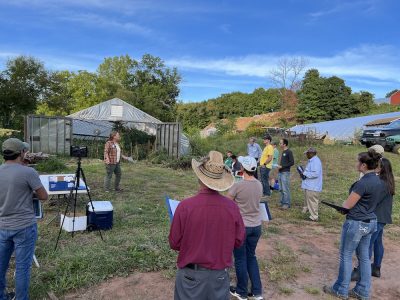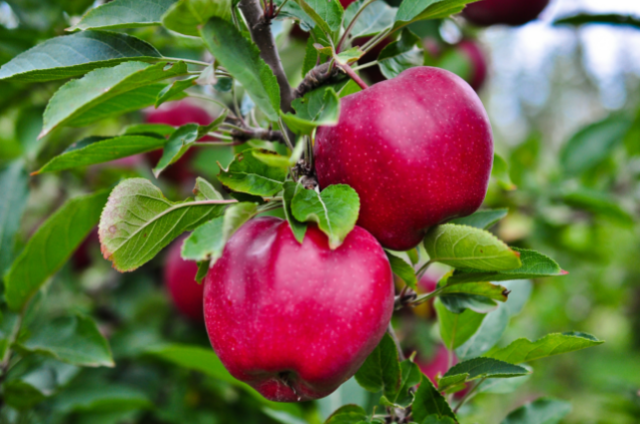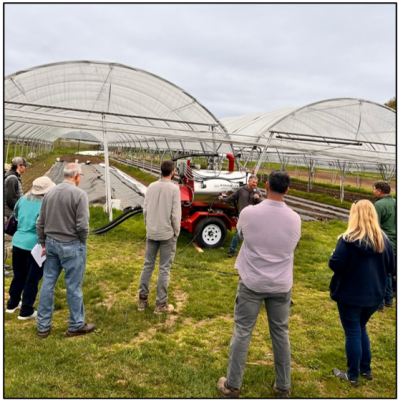Online Course Offerings
Ornamental and Turf Online Short Course – Registration Open! Begins Jan 14th
Winter 2026 Online Ornamental & Turf Short Course! The course runs January 14–March 25, 2026, with weekly live online sessions held on Wednesdays from 5:30–7:30 p.m.
Registration Cost: $400 (includes the Pesticide Applicator Core Manual, Ornamental & Turf Category Manual, and printed course materials).
For information on student registration or if you are retaking the course, please contact the instructor, Srikanth Kodati (contact information can be found at the end of this email).
This short course provides an in-depth review of the material needed to prepare for the Connecticut Supervisory Pesticide Applicator Certification Exam (Category 3A: Ornamental & Turf/Golf Course Superintendents). Students who complete all modules, quizzes, and resource materials will be well prepared for both the written and oral state exams.
The course consists of eight self-paced modules:
- Pesticide Laws & Regulations
- Pesticide Safety
- Botany
- Plant Pathology & Ornamental Plant Diseases
- Entomology & Insect Pests of Woody Ornamentals
- Area & Dosage Calculations
- Turf Management
- Weed Management
Each module includes learning objectives, narrated slides, topic sections, and a quiz. Modules can be completed and revisited at any time during enrollment.
https://s.uconn.edu/ornamentalturfcourse
For more information: https://ipm.cahnr.uconn.edu/pesticide-course/
Online Vegetable Production Course – Registration Open! Begins Jan 22nd
About: This is a fully online course for new and beginning farmers who have 0-3 years of vegetable growing experience or no formal training in agriculture. The participants will learn answers to the basic questions about farm business planning, planning and preparing for a vegetable farm, warm- and cool-season vegetable production techniques, season extension, identification of biotic and abiotic issues, and marketing.
Enrollment fee: The price of the course is $149.
Questions: Please contact the course coordinator, Shuresh Ghimire, 860-870-6933 or shuresh.ghimire@uconn.edu
Register: https://uconn.geniussis.com/catalog
Farm Risk Management Online Course Modules, Asynchronous & Free to the Public
Farm Risk Management Online Certificate
This unique program from the University of Connecticut's (UConn) College of Agriculture focuses on one of today’s most critical topics for the agriculture industry, farm risk management. Farm risk management involves understanding and mitigating factors that can impact agricultural operations, such as climate change, pest management, and financial uncertainties. Through this grant-funded 12-module course you will gain knowledge and strategies to enhance the resilience and sustainability of your farm. Knowledge is the key.
Designed for the Agricultural Industry
Serving livestock farms, dairy farms, crop farms, fruit & vegetable farms, or anyone seeking to develop a farm, this free course is a must for the modern-day farmer. View the listing of modules.
USDA Funded & Free to the Public
UConn’s Farm Risk Management Online Course modules are developed in conjunction with UConn’s College of Agriculture, UConn’s Center for Excellence in Teaching & Learning, and UConn’s Academic Program Development & Support unit, and are funded by a grant from the United States Department of Agriculture (USDA).
Flexible & Convenient
Take one module or all twelve Farm Risk Management online modules. Learners will receive a course completion certificate for each module completed that can be downloaded and printed.
Courses are self-paced and offered 100% online and asynchronous; you can participate in the course at any time of day from anywhere with an Internet connection.
How to Register
Registration for UConn’s Farm Risk Management Online Course modules is facilitated by UConn’s non-credit online course registration platform. Register Here.
UConn Extension Events
Solid Ground Farmer Trainings
Solid Ground offers in-person training opportunities as well as e-learning tools for new and beginning farmers. These trainings are intended for production farmers in Connecticut. A sample of available trainings include topics such as Ag Mechanics, Business of Farming, and Risk Management.
See their full calendar of upcoming events: Solid Ground Farmer Trainings
February 11th, Spring Bedding Plant Workshop 2026
February 11, 2026 | 8:30 AM - 2:15 PM
Connecticut Agricultural Experiment Station, Jones Auditorium
123 Huntington Street, New Haven
Join us for the 2026 UConn Spring Bedding Plant Workshop in New Haven, CT. This workshop is for commercial greenhouse growers of bedding plants and herbs. There will be speakers discussing the latest techniques for management of insects and diseases, improving water quality, and crop nutrition. The speakers are experts from universities and companies in New England and Pennsylvania. There have been three pesticide recertification credits requested for this program from Connecticut and New England states (categories PA, 1A, and 3C) and one from NY (3A). Registration includes coffee/light breakfast and lunch, generously sponsored by BioWorks and Gowan USA.
Cost: $55
Register: https://secure.touchnet.com/C21646_ustores/web/product_detail.jsp?PRODUCTID=5629
Questions: charles.krasnow@uconn.edu
Community Programs
Participate in UMN/UNH High Tunnel Cover Crop Trial
Becky Sideman at University of New Hampshire is once again putting the call out to recruit organic high tunnel growers as part of an OREI funded high tunnel cover crops project. This Fall 2025 trial will look similar to last year’s: growers will get sent seed, a free soil test and help interpreting it, and will be asked to complete a couple of short surveys to let the researchers known how it went. A biomass sample from the following spring would be ideal as well, but is not required.
These on-farm trials are meant to evaluate how legume cover crops perform in active farming systems. Farmers will not be asked to plant replicated arrangements of the trial plots on their farms. Instead, researchers will plant all of the cover crop options in replicated plots on a research station, while each participating farmer plants one plot of each of the cover crop options that they select. Farmers can select between two levels of participation and compensation, depending on the amount of time and effort they are willing to commit.
- Read the full trial instructions, detailed species and timing menu, and farmer expectations for each level here .
- Watch the recording of the High Tunnel Cover Crop Trial Webinar
- Sign up to participate by telling the team which species you’d like to grow and how much seed to send.
Contact the research team with questions: hightunnel-cc@umn.edu
Submit a Soil Sample to CAES for Program Providing Free Analysis of PFAS
The new program, which is voluntary for CT farms, provides sampling kits to ensure contamination-free soil collection, and provides data on 14 PFAS directly to the farmers who submit samples. “Our hope is that PFAS data will help farmers protect their safety and that of their customers” says Jasmine Jones, the PFAS technician at CAES. PFAS found in farm soils may impact crops and livestock, and may pose a risk to drinking water wells on and near farms. There are no enforceable limits for PFAS on farms at the state or federal level, though high levels can be harmful to human and animal health. “Collecting data on PFAS concentrations at CT farms is an important step towards understanding the scope of PFAS contamination issues in CT” says Sara Nason, Ph.D., a research scientist at CAES. The new CAES program uses a certified EPA method for soil analysis, and has ISO:17025:2017 accreditation, an internationally recognized lab quality certification. “Data quality has been a big priority for our PFAS measurements” says Nason.
Additional program information can be found on the CAES website at:
https://portal.ct.gov/caes/about-caes/pfas-in-ctagricultural-soils/pfas-in-ct-agricultural-soils.
Detailed information on PFAS can be found on the following websites:
Get free soil health testing on your farm by participating in AFT’s New England Soil Health Survey!
New England Soil Health Survey
Free Soil testing is available through a new program from AFT New England and the USDA ARS Food Systems Research Unit. Farms in Vermont, New Hampshire, Connecticut and Massachusetts are eligible to receive free soil health testing on up to three fields after completing a short survey.
Learn more at: https://farmland.org/new-england-soil-health-survey/
UConn Extension Online Library
Browse past educational events hosted by UConn Extension. Recordings of educational videos can be found on the UConn Extension YouTube playlist entitled "Agriculture and Food".
Recordings & Event Archive
Agritourism Webinar: Harvesting Prosperity (Jan 2025)
On Thursday, January 30th, UConn Extension hosted a webinar for farmers looking to establish, diversify or expand their business through agritourism. You can access the complete recording of the webinar through the link below.
There were 86 participants who attended the webinar live, giving them the opportunity to ask questions directly to the farmers and agricultural service providers presenting. Of the 36 post-webinar survey participants, 100% responded positively (selecting "yes" or "maybe") to learning something during the event. Examples of key learnings reported included topics such as insurance coverage, expanded offerings of agritourism, business planning, thinking about the customer experience, and creating a culture of safety for employees and visitors alike.
94% of survey participants responded positively (selecting "yes" or "maybe") to intending to make changes to their business based on information they learned from the webinar. Such action items include expansion of agritourism activities, review/updating insurance policy, updating/expanding business plan, making improvements to their infrastructure, and updating safety protocols.
General feedback from participants included:
- "Very informative"
- "Great webinar with valuable information for those considering starting agritourism and creative ideas for those already in the agritourism market"
- "Good speaks, nice variety of topics and examples"
For additional information on the presenters and access to the resources shared throughout the webinar, please visit https://agriculture.extension.uconn.edu/agritourism-resources/.
Vegetable Twilight Meeting at Cold Spring Brook Farm (Sept 2022)
UConn Extension held a Vegetable Twilight Meeting at Cold Spring Brook Farm in Berlin, Connecticut on September 21, 2022. The video below is a recording of the meeting, and the handouts shared are also included.
Handouts
Handout 1 – Uneven Ripening in High Tunnel Tomatoes
Handout 3 – Biodegradable Mulch
Our work with high tunnel vegetable production is supported by USDA NRCS Conservation Innovation Grant Award # NR203A750008G009/Subaward # 0008145/07132020, and our work with biodegradable plastic mulch is supported by USDA Crop Protection Pest Management Program Grants # 2021-70006-35582 and 2017-70006-27201.
UConn Extension Vegetable and Fruit Growers’ Conference
The UConn Extension Small Vegetable and Fruit Growers’ annual conference and trade show provide an opportunity for area farmers and other growers/producers to network and obtain updates via informational talks regarding production practices as well as financial trends and opportunities. See the links below for historical topics and presentations.
Jan. 2026, UConn Extension Vegetable and Small Fruit Growers’ Conference
Visit our conference website for more event information.
Jan. 2025, UConn Extension Vegetable and Fruit Growers’ Conference
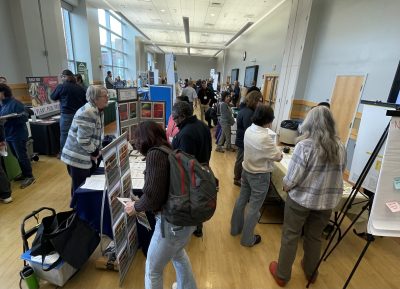 On Tuesday, January 7, UConn Extension hosted its annual Vegetable and Small Fruit Growers’ Conference at the UConn campus in Storrs. There were approximately 222 attendees present, representing commercial growers, non-commercial growers, service providers, Extension faculty and educators, researchers, students, arborists, and local cideries. Amy Harder, Associate Dean and Associate Director for Extension, and Indrajeet Chaubey, UConn CAHNR Dean and Director were also in attendance. Both spoke to the importance of these convenings and UConn’s historic connection to agriculture.
On Tuesday, January 7, UConn Extension hosted its annual Vegetable and Small Fruit Growers’ Conference at the UConn campus in Storrs. There were approximately 222 attendees present, representing commercial growers, non-commercial growers, service providers, Extension faculty and educators, researchers, students, arborists, and local cideries. Amy Harder, Associate Dean and Associate Director for Extension, and Indrajeet Chaubey, UConn CAHNR Dean and Director were also in attendance. Both spoke to the importance of these convenings and UConn’s historic connection to agriculture.
A total of seven presentations were made on the main stage throughout the day-long event. A packed trade show with 35 vendors also occurred simultaneously, as well as the opportunity to browse research poster presentations during the breaks. For many in attendance, the conference also served as an opportunity to gain pesticide recertification credits.
Of the 74 evaluations collected from participants at the close of the day, 97% of responded positively (73% "Yes" and 24% "Possibly") to learning something from the conference that will help them with their business. Recurring themes from examples of knowledge gained included information about:
Winter growing and the benefits of high tunnels
Growing strawberries and weed management in strawberry fields
Effective strategies for incorporating value-added products
Recommendations on sweet corn varieties and pest management strategies
Farming in freight containers
Agricultural trends for vegetable and fruit growers
Farming in freight containers
IPM strategies for disease prevention
There was optimism among growers with 79% of respondents indicating positively (24% "Yes" and 55% "Possibly") that they would incorporate learnings from the conference into their farming operations. Some written feedback from attendees stated "Excellent mix of speakers" and "Very informative". We have also received great suggestions from the participants for topics and speakers for the next year's conference.
We hope to see you at the next Vegetable and Fruit Growers' Conference in January 2026!
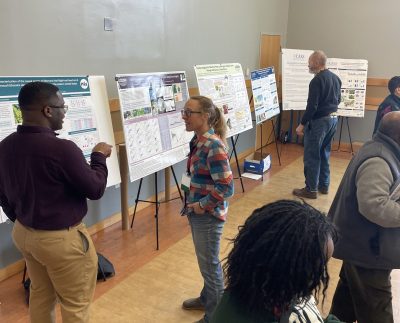
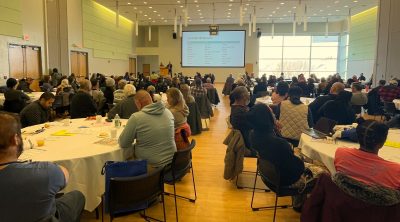
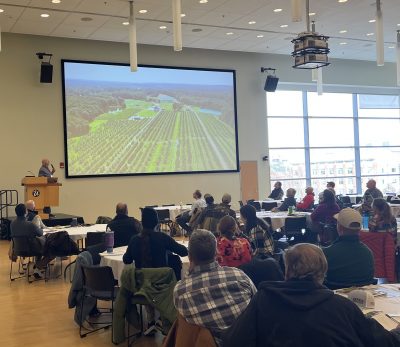
All talks and speakers can be found in the full 2025 program, linked here.
Click on links below to access presentations from the 2025 conference.
A Look Into Value Added Agricultural Offerings
Sweet Corn At Gresczyk Farm
Weed Management Strategies For Strawberries
Dangers Abound: Protecting Connecticut Strawberries from Invasive Fungal Pathogens
High Tunnels For Winter Growing: Techniques And Tips From Farmers
Northeast Agriculture: An Overview
Growing In A Freight
Jan. 2024, UConn Extension Vegetable and Fruit Grower’s Conference
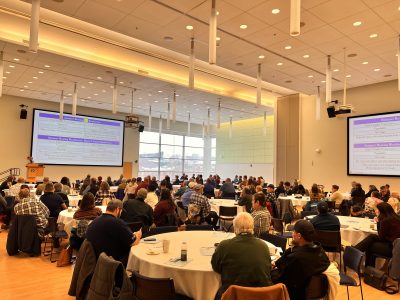
The 2024 UConn Extension Vegetable & Small Fruit Growers’ Conference was held at the UConn Storrs campus in the Student Union on Tuesday, January 9. The conference was co-organized by UConn Extension and the Connecticut Agricultural Experiment Station (CAES). There were a total of 211 attendees, with 138 regular admission, 14 speakers, and 47 vendors and sponsors with 35 booths.
Out of 87 evaluation respondents, 99% replied positively (70% "Yes" and 29% "Possibly") that they learned something that would help them with their business. There were many great examples of topics that proved helpful to the attendees, including biodegradable plastics, mesotunnels for cucurbit production, pest control methods, and fertigation/injection systems. 80% of respondents replied positively ("Yes" or "Possibly") that they intend to make a change in their farming practices/operations from what they learned at the conference. The 2024 conference was held at a new location, the Student Union at UConn's Storrs campus. 84% of respondents reported they either preferred this new location or had no preference for the location of the conference.
There were 14 speakers total, with topics including (but not limited to) high tunnel tomato nutrient management, bramble production in different seasons, Aroniaberry production as a new niche crop, trap crops and insectary plants, biodegradable plastic mulch, and crop insurance. All talks and speakers can be found in the full 2024 program, linked here. Some feedback received from attendees includes: "Loved the new location!" and "Overall great conference". We have also received great suggestions from the participants for topics and speakers for the next year's conference.
We hope to see you at the next Vegetable and Fruit Grower's Conference, which will be held at the same location (Student Union in Storrs campus) on January 7, 2025! Below are some of the presentations that were featured at the 2024 conference.
Click on each link to access the presentation.
Aroniaberry: A Native Superfood Pome Fruit
Soil-Biodegradable Plastic Mulches for Specialty Crop Production
Jan. 2023, UConn Extension Vegetable and Small Fruit Growers’ Conference
The 2023 CT Vegetable and Small Fruit Growers’ Conference was held Wednesday, January 4.
Please find below the PDF versions of the presentations.
Drone Imaging to Monitor Potato Leafhopper Damage in the Field
Vegetable benefits and disease control of nanotechnology
